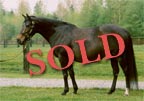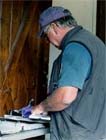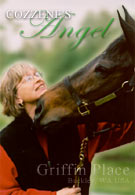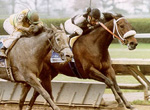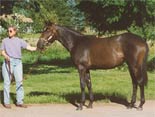

Connect with us... |
| In The News - 2003 Past Entries | |||||||||||
|
12/24/03 View from the Rail: Racehorse for Christmas not a far-fetched notion 'Twas the night before Christmas and all through the house 6/9/03 Eye for bargain led breeder to Cozzene's Angel AUBURN, Wash. - Good timing and good luck are essential ingredients for success in the breeding industry, and Mary Lou Griffin has had generous portions of both since she purchased a 7-year-old mare named Cozzene's Angel for $35,000 at the November 2000 Fasig-Tipton sale in Kentucky. At the time, Cozzene's Angel, a stakes-placed daughter of Cozzene, was in foal to an unproven sire named Aggressive Chief, and nobody had heard of her first foal, a weanling son of Awesome Again named Toccet. Last year, Toccet won 6 of 8 starts, including Grade 1 victories in the Champagne Stakes and the Hollywood Futurity, before being sidelined by a bruised hoof this February. Because of Toccet's success, Griffin's investment in Cozzene's Angel has multiplied in value. "I followed Toccet's 2-year-old campaign with a lot of interest, naturally, and I was amazed and excited by what he did," said Griffin. "I was incredibly lucky to buy Cozzene's Angel when I did. I could buy a thousand mares and never come up with another who foaled a horse like Toccet." All the same, Cozzene's Angel wasn't the first big success for Griffin and her husband, Terry, who have owned Griffin Place farm in Buckley, Wash., for the past 25 years. The couple earlier purchased a Red Ryder mare named Outofthebluebell and bred her to Metfield, producing Rings a Chime, a winner of the Grade 1 Ashland Stakes in 2000 who earned more than $600,000 for her owners, Turf Side Stable. Mary Lou Griffin sold Rings a Chime as a yearling for $26,000. She went to the sale where she bought Cozzene's Angel because Rings a Chime was being sold there. "Rings a Chime was in the sale, and I went to Kentucky with some friends just to watch her sell," she recalled. "I really wasn't looking to buy anything myself, but once they put a catalog in my hands I couldn't help but look at it. There were several mares I liked, and Cozzene's Angel was one of them, but I didn't think I had a shot to buy her. I figured I could spend $30,000, and she had sold for $200,000 when she was in foal with Toccet. "It was just one of those things, though. She was in foal to an unfashionable sire and nobody seemed interested. When the bidding slowed, I realized I might actually be able to buy her, so I went to $35,000 and she was mine." She bought Cozzene's Angel from Daniel Borislow, the owner and breeder of Toccet. Toccet hadn't hit the headlines when Griffin sold Cozzene's Angel's Aggressive Chief filly at last year's Washington Thoroughbred Breeders' Association sale in early September, so she went for only $11,000. The buyer, Tim Bankers, resold her privately to Borislow. Cozzene's Angel has since dropped a yearling Out of Place colt, who will sell this September at Keeneland, and a weanling filly by Liberty Gold, a promising young Crafty Prospector stallion who stands at El Dorado Farms in Enumclaw, Wash. On Tuesday, Cozzene's Angel was bred in Kentucky to Deputy Minister, the sire of Awesome Again, so the resulting foal will be closely related to Toccet. "I would think that foal will be very attractive commercially, so we will probably sell it in Kentucky," said Griffin. "I'd love to keep one of Cozzene's Angel's fillies for eventual use as a broodmare, but we are commercial breeders. We have offered everything we have bred for sale, and the only one that didn't sell was Best Judgement, who ended up being named Washington-bred 2-year-old filly of the year in 2000." Best Judgement is one of 10 members of the Griffin Place broodmare band, a group that now includes three Grade 1-quality mares. In addition to the Grade 1-producing Outofthebluebell and Cozzene's Angel, the farm is also home to Lady Beverly, who won Woodbine's Grade 1 Selene Stakes. While good luck and good timing have played roles in the success of Griffin Place farm, another factor has played at least as important a role. Mary Lou Griffin has repeatedly used her judgment to take advantage of opportunities as they have presented themselves. Because of that, it's likely the purchase of Cozzene's Angel won't be the last of her breeding successes. 6/2/03 Toccet's Half-Sister Born in Washington
Nine-year-old Cozzene's Angel is booked to Deputy Minister, who holds court at Fred Seitz' Brookdale Farm near Versailles, Ky. She arrived last week at John Sikura's Hill 'n' Dale Farms near Lexington. Mary Lou Griffin bought Cozzene's Angel in foal to Aggressive Chief for $35,000 at the 2000 Fasig-Tipton Kentucky November sale from FitzGerald/Keogh, agents. She produced a filly from that mating. Named Brooklynsangel, she has not yet started. Cozzene's Angel (Cozzene -- Charming Pan, by Trepan) also is the dam of an Out of Place yearling colt. Three-year-old Toccet, her first foal, is owned by Daniel Borislow. 5/9/03 Griffin Place - Creating a Racehorse It starts with a dream, a warm image of cheering crowds, a photo finish, and a winner's wreath of roses. It is a dream of breathing life into a horse that will run like no other has run before. That dream, after years of careful nurturing, sweat, training and plenty of luck, may finally become a racehorse. A Thoroughbred that will carry the hard work, hunger and hopes of so many down the stretch and across the finish line. The dream of creating a racehorse is the daily mission of Mary Lou Griffin, owner of Griffin Place, a broodmare farm located in the idyllic green of Buckley, Washington. Mary Lou and her husband, Terry, have spent over 25 years building their business, horse by horse, foal by foal, until today they are considered one of the premier broodmare farms in the state for blood horses. “It really begins with an idea,” Mary Lou said. “I look at a mare and I try to see in my head the kind of foal she could produce. Then I research and try to find the best stallion to match with the mare.” Sounds easy enough, but follow the sunny smile and warm disposition
of Mary Lou around for a day and the pure dedication of her life becomes
abundantly clear. The farm is a series of fenced fields with numerous pens, sheds and barns strategically set along the 40 acres. Dappled mares graze on the grass while scrawny-legged foals and feisty yearlings romp and play.
Starting around 6 a.m. Mary Lou begins feeding her horses with her stable hand, Victor. After the feeding program is complete, she takes her teaser pony to the mares. A teaser is a horse used to find out if the mares are ready to be breed. “Tommy teaser may be the most valuable horse I have,” Mary Lou said. “I bought him 10 years ago and he's been great.” She leads Tommy down the lane between the fenced fields, “and if a mare comes over and starts nosing around Tommy we know she's probably ready.”
The next step is for the veterinarian, Dr. John Proctor, to examine the horse. If the mare is deemed to be ovulating after his examination, Mary Lou loads the horse into her trailer and off they go to El Dorado Farm in Enumclaw, or to eastern Washington, or they are shipped to Kentucky, depending on which stallion she has picked for her mare. Once the mare has been bred to a stud, the true work begins in
earnest. Every stall is monitored by video cameras and microphones, all connected to screens in Mary Lou's office. As the mare comes to term she is placed in a stall and Mary Lou begins a 24-hour vigil, watching and listening until the foal is born. During the night, from a cot in her office, she will keep watch on the video and listen for up to four or five nights. Once the birth begins, the mare is moved to a sterile stall, bedded with a thick layer of clean straw. “If there are any problems I have to be right there to correct it,” Mary Lou said. “Sometimes maiden mares rush too much, or push too hard, so I have to be there to guide the foal's feet.” Mary Lou has been midwife, doctor and best friend to countless foals and mares over the years. Mary Lou's path to Griffin Place and the lush landscape of the plateau was anything but a straight arrow line. She grew up in Minnesota in a kind and caring home. “I was a horse crazy kid,” Mary Lou said. “Every waking moment I drew pictures of horses. I had very indulgent parents, so with some of my money and a lot of theirs they bought me a spotted mare I named Paint. That horse lived to be 41 years old. She died the same day as Secretariat. She's buried here on the farm.” Mary Lou graduated from Colorado State University as an Art major. She married her husband Terry in 1966. He was an army officer and one day the couple found he was to be transferred to Fort Lewis. The path of her life was about to dramatically change. They were living in an apartment in Spanaway next to Rick and Debbie
Pabst. The Pabsts had become interested in breeding Thoroughbreds and as
Mary Lou watched them start out with one mare, “I thought to myself this
is something I could do. Then in 1973 I saw Secretariat run and that was
it. It was clinched.” Today Mary Lou calls the Pabsts, who are neighbors and fine breeders themselves, close friends and mentors. “I couldn't have built this without them,” Mary Lou said. Despite bumps in the road early on, the emotional ups and downs of the blood horse business and the birth of her own children, Devin and Keelia, Mary Lou hung in there.
“It helps to have a positive outlook and enjoy the good times when they come,” Mary Lou said. Today, Griffin Place is home to some of the top brood mares in the state. Cozzene's Angel, the dam of 3-year-old running
sensation Toccet, is in foal at the farm. Rings A Chime, one of only five Grade I stakes winners ever bred in the state was born and raised at Griffin Place. Silver Screen Girl, a 5-year-old mare by Silver Ghost, born and raised at Griffin Place, runs in her first stakes race at Emerald Downs on Sunday, May 4. The list is long and impressive, and builds year by year.
After birth the foals live one year at Griffin Place under Mary Lou's watchful eye, and in September they are sold. “We're market breeders. All of our yearlings are sold,” Mary Lou said. “That's why we don't name them. We try not to get too attached, but it's hard sometimes.” In January the cycle begins again. Breeding and birthing runs from January to June; the care, the work and the dream goes on day after day, year after year. Mary Lou's commitment to horses, horse racing and her community runs wide and deep through spirit that is Griffin Place, and as she walks across her quiet green fields, she can know that her dream has been made. “It is a life style, not a job, I couldn't do what I do if it wasn't for my husband, my children and everyone that has helped me along the way.” |
| 2007 Past Entries | |
| 2006 Past Entries | |
| 2005 Past Entries | |
| 2004 Past Entries | |
| 2003 Past Entries | |
| Copyright © Griffin
Place 2002 -
Contact Us! |
|
